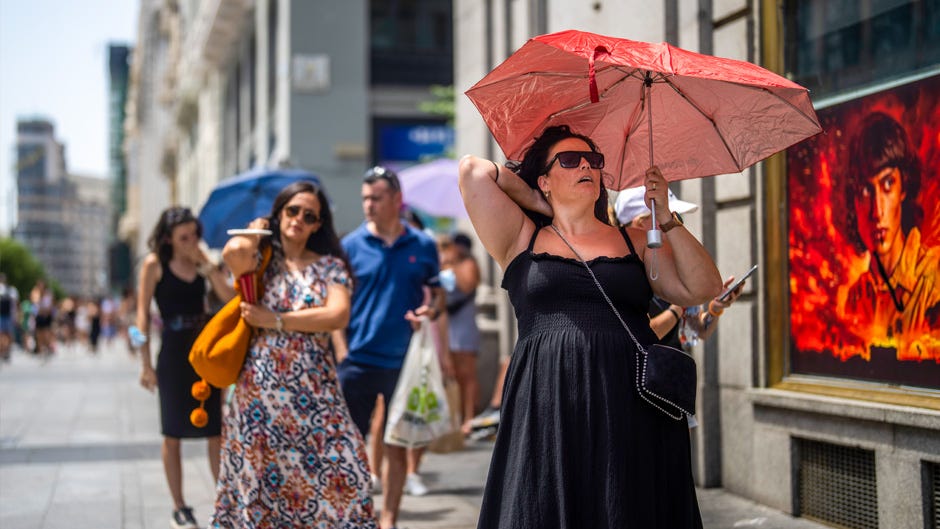After 9/11, I remember commentators saying, unequivocally, that the world had changed. Recently it's occurred to me that from an American perspective the 20th century didn't end so much as it was assassinated -- and it was possible to have some amount of the measure of it even at the time.
Today, it seems like we’re crashing through one epoch-marking event after another. Trump's election. The BLM protest movement. Covid. The Big Lie and Jan. 6. hearings. It feels harder and harder to process it all, and it feels like that collective, comparatively sober ground from which people were able to engage shattering events before is itself going away.
It's stunning to think that something like the European heat wave should be something that has to be pulled out from the noise, and yet it feels like it is. It feels like it's getting lost, and if so, it definitely needs not to be. Roads and runways melted. Train tracks buckled. Hospitals had to postpone surgeries because operating rooms were too hot. Seasonal wildfires were unusually rapid and intense, and they occurred in unexpected place. More than a thousand people died.
And the absolute, fundamental truth is, this summer -- any summer -- is just the beginning.
Most notably to me, Europe is nearly without air conditioning. They haven't needed it. Meanwhile, air conditioning comprises about ten percent of U.S. energy consumption. Fortunately, Western Europe is a global leader in climate crisis response. But what happens if 265 million people in the U.K. and Western Europe start to think about buying an air conditioner? Systemic impacts of climate change are going to increase demands on resources and energy -- just to respond. When climate modelers have warned about positive feedback loops, it seems like they really meant it.
And meanwhile, this week U.N. Secretary General Antonio Guterres noted that current national carbon reduction progress forecasts a fourteen percent increase in carbon emissions by 2030, when scientists recommend a forty-five percent decrease in the same amount of time -- in order to reach an eventual global goal of net zero by 2050. We are not only missing the targets, we are still heading in the wrong direction.
And 2030 is less than eight years away.
It's increasingly clear to me that the thing to see in all this is not the behaviors; it's the attitudes. The climate crisis predictably threatens the stability of our way of life in the next few decades, and it is the tip of the iceberg of a larger consumption crisis. The results will be destabilizing for you and me, but they will be cataclysmic for the third to half of the human race with fewer material resources. In the U.S. we have not yet really even noticed.
I struggle to find the language. Picture hospitals unable to do surgery in England because of an anthropogenic heat wave. Look at photos of the melted roads and heat-damaged structures. These things have occurred. Then try to imagine that four times the population of the United States may be displaced from their homelands by 2050, because in one way or another the heat will have made it impossible to live there.
And then, take your family to go see Thor: Love and Thunder. And look into the face of every person you see there. Don’t disdain them. And don’t misunderstand me, I’ll go it see it, too. But just look. What do you see?
Realize that, in the United States, which generates 28% of global greenhouse emissions, there is not even the political will to have a national conversation about the situation, and something like a third of the population aren't sure there's anything to worry about.
It's maybe ironic to use a pop culture message to drive the point home, but I find myself thinking more and more the past few years about a moment in Revenge of the Sith when Padme turns to Anakin and says, "Have you ever considered that we may be on the wrong side?"
I wish I could find better words to illustrate it, but I feel there is a particular attitude to be perceived. Picture a house party on the Titanic. Picture people in football jerseys waving foam #1 fingers -- on the Titanic. Picture suited speculators of all shapes and sizes -- on the Titanic. Or picture all of the above where they are, then think about the 1.2 billion people on the move in the heat. That's the attitude I mean.
We live in The Republic, and as with Anakin and Padme, circumstances are rapidly changing around us. And the hard truth is that, if we know we’re participants in the problem, but we have not taken the steps to no longer contribute to the problem, then we are still part of the problem.
Have we ever considered that, to some extent, we may all still be on the wrong side?

